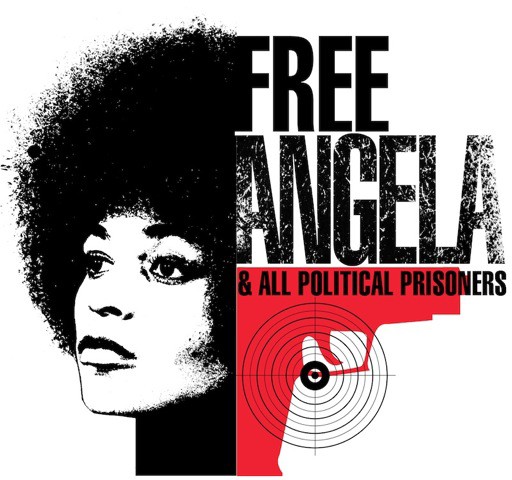The Toronto Film Festival launches tomorrow and there are women directors all over the lineup. We reached out to a couple of directors whose careers are on the way up (we will have some of our masters for you tomorrow) and asked them to answer a couple of questions as the Festival kicks off. I will try and see as many films as possible over the 8 days in Toronto. Please follow me on twitter @melsil and/or follow Women and Hollywood on Facebook for updates throughout the day.
There are many women directors to talk to. We asked them all to answer the following questions:
1- Give us a one sentence description of your film.
2- What is different about this film from your other films? (Some of the directors in this piece are premiering their first film)
3- Toronto is featuring so many great women directors, yet women directors still are stuck down in the single digits in feature film making (the numbers are better in docs.) Why do you think it is so difficult for these numbers to rise and talk about any ideas you might have about how this could change.
Gauri Shinde — English/Vinglish
Nina Davenport — First Comes Love
Catriona McKenzie — Satellite Boy
Treva Wurmfeld — Shepard & Dark
Ramaa Mosley — The Brass Teapot
Shola Lynch — Free Angela and All Political Prisoners
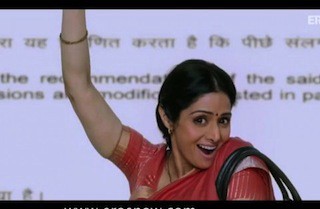
Gauri Shinde went to the New York Film Academy. She has directed commericals and short films including Oh Man and Y Not. English Vinglish is her first feature film.
Shinde: English Vinglish is a story of an Indian woman who struggles with the English language and her insecurities thereof.
Shinde: This is my first feature film.
Shinde: This story has been inspired by my mother’s life experience. She was a strong woman who raised two children, ran a household and a small business. However she couldn’t speak English and all the other positives seemed irrelevant when faced with this simple fact. Her insecurity in not being able to speak a language that was not even her own had become a large block in her mind was both relevant and interesting for me. I always had in mind doing a story that was personal to me but yet held some simple universal truths and English Vinglish was born out of that. It is ultimately about a woman speaking up for herself and asserting control over her life by tackling a problem head on. It could be any problem, in English Vinglish, I use language as the medium to weave that narrative into focus.
Shinde: It is very encouraging to see that Toronto is featuring so many great women directors and for me personally it was a big reason for why we wanted to premiere here. The unfortunate fact that there are still not enough women directors is reflective of a larger truth…which is that women for the most part are still underrepresented in a lot of areas beyond films. Be it politics, finance etc. It’s more of an universal story that women’s voices have been hushed for longer than they have been allowed to speak…having said that, I am very positive about the future…The film industry historically has been a bit more supportive of women and their involvement then a lot of other industries..within the film fraternity in particular one should not just look at how many women directors there are as a benchmark for success…one should instead look at women’s role in all aspects of movie making and in that light English Vinglish has a woman director.
I am proud to say we have an accomplished woman editor, a woman producer one from India and one from New York and the costume and casting headed by women from both countries. My two main assistants are women. The more women are involved in all aspects of film making, you will see numbers grow for them all including directors. I think looking at the big picture of encouraging women to be involved in film making will be the most important step towards seeing a growth in women directors. The other thing that is a sure fire way to see the numbers change is success…the more successful the movie is, the question of who directed it becomes less relevant.
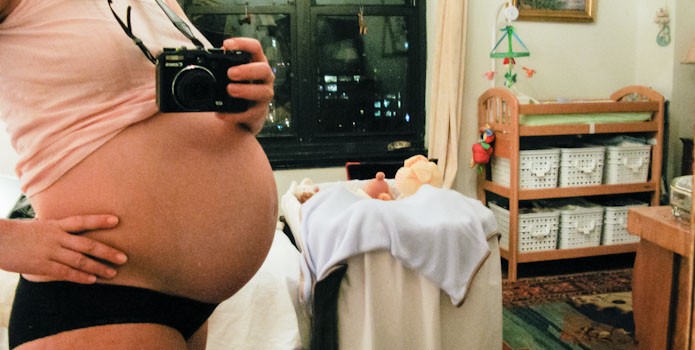
Nina Davenport received her B.A. in Visual Studies from Harvard. She has directed several documentaries Hello Photo, Always a Bridesmaid, Parallel Lines and Operation Filmmaker. First Comes Love is an HBO Documentary.
Davenport: An autobiographical film about my decision to have a baby on my own.
Davenport: I always appear as a character in my films, to one degree or another. In this film, I push the boundaries of honesty and self-exposure further than ever — including showing myself giving birth!
Davenport: I had made a film in 2000 called Always a Bridesmaid — about being a wedding videographer and wishing I were getting married myself — and this seemed like a perfect sequel. I thought to myself, I could I not make this film?!
Davenport: I think the issue is not only about basic gender discrimination — namely, the false notion that men are somehow more capable than women — but also that the male sensibility tends to dominate the landscape. And that’s probably simply because there are more men in powerful positions, they like male-centric stuff, they choose it for festivals, etc. and then it has a trickle-down effect. But I don’t know for sure, it’s simply conjecture.
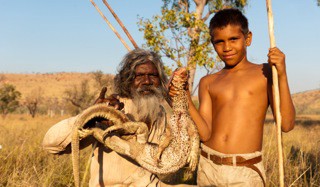
Catriona McKenzie has directed the short films The Third Note and Road and numerous television shows. She attended the Australian Film, Television and Radio School. Satellite Boy is her first feature film.
McKenzie: Satellite Boy is an allegorical adventure about ones boy’s quest to find his homeland, and his heart.
McKenzie: My first short film was a boxing film — no dialogue and a muscular cinematic language to drive the narrative. Plenty of violence in that film!
My next film, The Third Note was based on a sound theory. The harmonic idea was a metaphor for the neighborly dispute that was the central question of the film. It was a war of sound between two people across one backyard fence.
McKenzie: So in previous films I had explored narrative drama and how it is often driven by violence, (on some level). It certainly ups the stakes. But what if there was a different way of constructing a story? With Satellite Boy I wrote a story, distilled. Archetypal. My touchstone was a sculpture by Brancusi. I wanted to take the audience on a journey — as much experiential as plot driven. When you are deep in the Australian desert surrounded by the space of country and the Milky Way you are forced to look at ones self. It is an initiation of sorts. And you come out the other side of the film with something new, changed.
I wrote this story based on my own experiences, but transcribed onto different characters. I wanted to take an audience on a journey, an adventure, into another world, my world and cosmology, wrapped up in familiar universal dynamics in a completely fresh way!
McKenzie: In Australia there are many women directors both in TV and film. I don’t have any statistics and this is purely anecdotal but I think we do well in the industry. As a woman director my reputation is as a muscular, visually dynamic director, with the ability to work with actors towards great performances. I love stunt work, car crashes, technical stuff and visual effects but I thrive on going for great performances too. So I’m technical and emotional all wrapped up together. There have been times when I’ve been the first woman to direct a TV series — and I’ve always found that odd. I think most woman have this ability to juggle many different ideas and tasks at once — the perfect directing combination.
So it really surprises me that there aren’t more women directing movies. I have no idea why it’s that way in other territories either. Then again, who wouldn’t want to direct — it’s the most fun to be had. I’ve directed TV commercials as well as TV drama. Satellite Boy is my first feature film but I loved it and am already planning my next film. I get to use both sides of my brain as the process moves through writing to financing to pre-production into filming and post. It is such fun!
Perhaps that fun is a tad closely guarded. But I think there will be a changing of the guard. It’s pure economics really. If women are the majority decision makers when it comes to what movies are seen, then it makes sense that producers will gravitate to women filmmakers. I don’t go to work thinking about myself as a woman director. I’m very clear about what I do and how I do it and it’s difficult to argue with results.
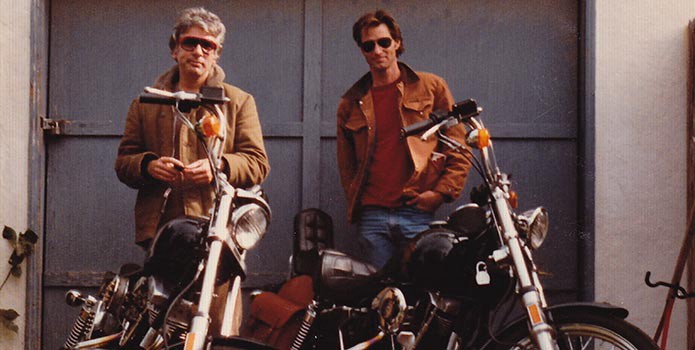
Treva Wurmfeld directed the documentary short Oyster and documentary feature Texas Heart.
Wurmfeld: Shepard & Dark is a portrait of the complex relationship between playwright/actor Sam Shepard and his close friend Johnny Dark as they prepare forty years of their correspondence for publication, stirring up old memories both good and bad.
Wurmfeld: Shepard & Dark is intensely honest. The subjects are writers who possess, and shared with me, a level of self-insight that I had never witnessed before.
Wurmfeld: I am endlessly intrigued by the creative process and when the opportunity presented itself to look behind the scenes of one of America’s foremost playwrights — I had to go for it.
Wurmfeld: It will likely take women rising from the independent scene and having to go greater lengths to prove themselves — just like most other industries. I believe it is critical for women to support women. Amy Hobby, the producer of Shepard & Dark, has teamed up with Anne Hubbell to create Tangerine Entertainment, an audacious new company that seeks to produce and co-finance critically acclaimed films with a rigorous focus on female directors and exceptional roles for women. This is a perfect example of how we can raise the numbers!
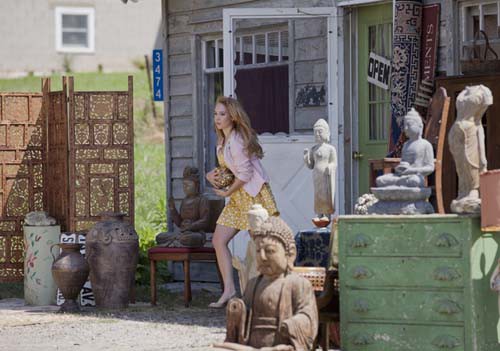
Ramaa Mosley has directed many short films and music videos many artists including Creed and Five For Fighting. The Brass Teapot is her first feature.
Mosley: The Brass Teapot is a magical comedy about Alice and John, young married and broke, who upon discovering a mysterious teapot, believe that it might be the answer to all of their dreams; until the teapot’s 2000 year old history, and the people who want it back, come knocking on their door.
Mosley: This is my first feature film. I’ve been directing commercials and music videos, as well as a few short films, since graduating college. This film has been different from my previous work in so many ways. My past work has been short form and I’ve made a career out of being able to tell short stories from: 30 seconds to 5 minutes. My commercial work falls in the docu style/ real people category and has been focused on human, authentic stories. I have striven to make the mundane, everyday lives of average people heroic.
Mosley: I was drawn to the idea of a magical teapot and the characters that might have possessed it. I was amazed with how many young people were seeking out the Brass Teapot short story and comic book online. The idea of a magical teapot captures people’s attention, I believe, because everyone fantasizes about winning the lottery. When I read the story and started working on creating the comic book, I felt that the heroes journey that Alice and John go on was one that I could see as a movie. John and Alice are average people, not particularly special at the beginning of the story. They have desires and needs that they want to fulfill, especially to get out of debt and buy nice stuff. I think the most interesting part of the story is their journey. They have a clear arc. Where they start off and what they believe they want is very different than where they end up and what they ultimately get.
Mosley: I think as more female directors have stories to tell that people want to see, there will be more female directors making movies. This is a business at the end of the day and having a strong hold on the stories that people want to see is key. I suppose the flip side is that producers and financiers need to believe in female talent. I just have a hard time believing that there are people who don’t want women to succeed in the industry. I think men and women want female filmmakers to have a shot. I personally think that when a strong director pitches their project, industry people are looking at the merit of the film, not whether they are male or female.
What is it going to take to get the number of female directors to rise? Women need to work a little harder to understand what the market wants and what the audience wants to see. Then, I think we need to all be blind to the sex of the filmmaker and instead focus on the stories the filmmaker has to share. If the script is good enough and the director is passionate enough — and the stars are aligned — the movie will get made.
Shola Lynch previously worked as visual researcher and associate producer for Ken Burns and Florentine Films. Her first feature documentary was Chisholm ‘72 — Unbought & Unbossed.
Lynch: Free Angela and All Political Prisoners is a documentary movie that asks how a bookish 26-year-old philosophy professor ends up on the FBI’s Most Wanted List and an international political icon in the early 1970s.
Lynch: Free Angela is a true 1970’s style film. The story is a political crime drama with a love story in the middle and many questions that can’t be answered.
I also ventured into recreations for the first time. They add enormously to the doc’s visual range. I loved working with Director of Photography Bradford Young and actress Eisa Davis, who is Angela’s niece and embodied her aunt, to bring the images to life.
Lynch: Angela Davis’ story doesn’t seem possible but it is true. The mystery around the story and the fact I knew very little about Angela Davis the person drew me. My focus became finding the real woman behind the icon.
Lynch: First question, how many directors are in double digits with features? It is hard for anyone to make movies.
Second, I don’t think the difficulty is about creativity. I think it is about business. Movie making is a business. The director is like the CEO of a project, who administers the budget, oversees the crew, and shapes the vision. We don’t see a ton of women directors for the same reason we don’t see a ton of women CEOs. There is a lack of confidence from investors in women to lead and get the job done in a male dominated field. Although the grey area is that individuals believe in women as leaders — and directors — it just doesn’t necessarily follow in business practice.
The best way to change the preconception is to be just as creative with the business as the filmmaking — to find and continually search for pockets where you can gain traction. At least this is what I think at the moment. Talk to me again when I’ve cracked the nut. Free Angela is feature doc number 2.
